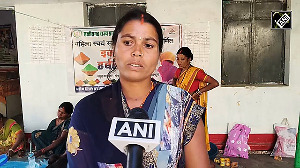While camera phones proliferate, camera brands are rushing out with digital technology to reclaim the consumer space that ought to be theirs.
Cellphones are all over the place. Correction: camera phones are all over the place. You can't always see them, but you do have ads on TV advising one to avoid clicking snaps without permission - indication enough that they are all over the place.
Where does that leave digital cameras - the regular little contraptions that snap pictures but you normally don't speak into? They're still in business - and rushing to get their act together before it's too late. Leading the pack in India are Kodak and Canon. Both these venerable imaging brands have launched a slew of marketing initiatives that could keep them well in the game.
"It's tough building a brand, and to build it in a market that is in growth mode can be a Herculean task," says Alok Bharadwaj, vice-president, Canon India. But he is not in a hurry to give up.
Canon recently launched a financial year calendar shot by ace fashion photographer Atul Kasbekar. Though new to the business of photography in India (Canon began its Indian tryst in 1997 with copiers), it intends to spare no effort in brandishing itself as the ultimate "digital image company".
With investments of approximately Rs 30 crore (Rs 300 million) lined up in engaging the consumer alone, Canon India is confident about making an impact. The strategy: engage expert opinion first.
"The professional photography segment will create Canon's image among professionals like Atul Kasbekar (also the brand ambassador for Canon products) who cannot be enthralled by commercials," he says.
The company aims to clock Rs 400 crore (Rs 4 billion) in 2006, which would be 40 per cent growth.
Canon reckons that the market is just at an appropriate phase in its evolution, too, for such a top-down approach. "Professional cameras is a highly growth segment to start off in. The products are state-of-the-art technology and are great as image builders," says Bharadwaj.
That digital cameras are the future is no longer in doubt. Canon's digital cameras saw their revenue contribution leap from 1 per cent in 2003 to 16 per cent in 2005.
Kodak is also staking its future on digital technology, and is keen to lead the transition in India. "Even though internationally about 50 per cent of the camera market is occupied by digital cameras, in India digital cameras represent a minuscule amount," says Ravi Karamcheti, managing director, Kodak India.
Unlike Canon, though, the old imaging warhorse is looking squarely at the voluminous consumer market. Kodak, the world's original imaging brand, is selling itself on ease-of-use in India, a promise that includes the wide network of Kodak outlets that let you take easy printouts of digital photos, no matter where you are.
"The concept of ubiquitous digital imaging and real-time sharing of images is capturing everyone's attention," says the managing director, "particularly as portable media players and sophisticated mobile communication devices become more prevalent."
Kodak is clearly on the lookout for volumes, and is trying to fend off competition by offering slickly designed cameras that look fashionable. "We have introduced products that are sleek, light and very simple to use. The bottomline for digital cameras is their ease of use," he says.
To make good on the promise, Kodak plans to create a wide network of ATM-like kiosks all over the country, which would let the consumer transfer, store and print pictures with just a few buttons.
"The concept is already popular internationally," he adds, "and I see no reason why it wouldn't click in India too." The kiosks are under test, and the metros and tier I cities can look forward to them anytime now.
"During 2006," Karamcheti predicts, "Kodak will look to offer complete solutions for viewing, editing, capturing, storage, sharing and printing."
There's plenty of action to go round, with the digital camera market growing at a dizzying 70 per cent per annum (even as conventional cameras slow to about 10-15 per cent). But still, imaging trends must now contend with disruptive influences, and even the image experts cannot take the future for granted.Do you want to discuss stock tips? Do you know a hot one? Join the Stock Market Investments Discussion Group







 © 2025
© 2025